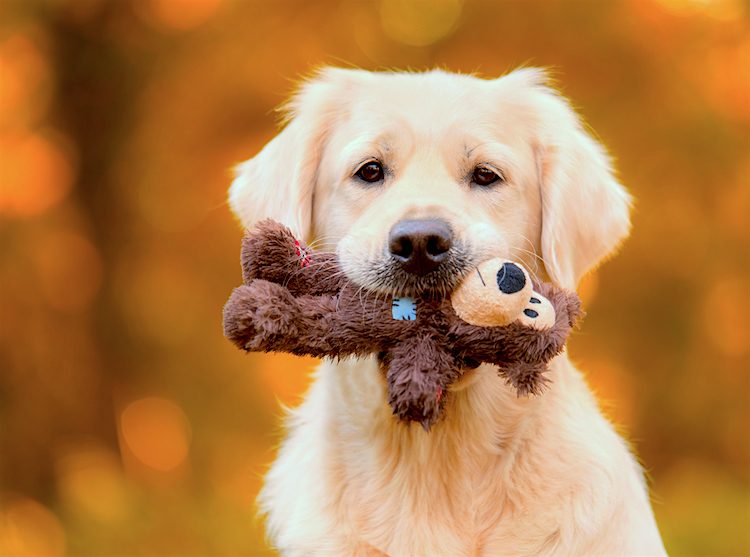

Sporting

65-75 lbs. (male);
55-65 lbs. (female)

23-24 in. (male);
21.5-22.5 in. (female)

10-12 years
Key Characteristics of Golden Retriever Puppies
Key Characteristics
Golden Retrievers are active and friendly dogs who have a water-repellant double coat.
- Coat: Water-repellant double coat
- Color: Signature gold color varies from light to dark
- Popularity: One of the most popular breeds in the United States
Where Golden Retriever Puppies Came From
Golden Retrievers were created in 19th-century Scotland by Lord Tweedmouth by crossing a Yellow Retriever with a Tweed Water Spaniel. The offspring was later crossed with Irish Setters, Bloodhounds, and more spaniels to become the breed we know today.
The cross-breeding produced a dog who would do well at retrieval on land or water.
- Early Shows: The dogs were first shown in England in 1908 at the Crystal Palace.
- Club Formation: The Golden Retriever Club of England was formed in 1913.
- Arrival in the U.S.: These dogs appeared in the United States starting in the 1920s.
- AKC Recognition: The American Kennel Club (AKC) recognized the dogs in 1925.
- Obedience Champions: The first 3 dogs of any breed to win the AKC obedience champion title were all Golden Retrievers.

How Friendly Are Golden Retrievers?
Golden Retrievers are friendly dogs who get along with everyone.
- Service Dogs: They are often trained to become excellent service dogs.
- Search and Rescue Dogs: They are also trained as search and rescue dogs.
They rarely show hostility or aggression toward other dogs or people. They are reliable, trustworthy, active, energetic, and always eager to please.
Are Golden Retriever Puppies the Right Dog for You?
Exercise Needs of Golden Retriever Puppies
HIGH: Golden Retrievers can be prone to obesity, so yours will need rigorous daily exercise.
- Activity Level: Active and energetic
- Health Maintenance: Need regular physical activity to stay healthy
- Behavior: Lack of exercise can lead to chewing or behavioral difficulties
Grooming Needs of Golden Retriever Puppies
MEDIUM: The Golden Retriever’s water-repellant double coat sheds seasonally, so you’ll need to brush yours regularly.
- Brushing: Experts recommend brushing these dogs at least twice a week, or more often as needed in the warmer months.
- Bathing: Golden Retrievers’ long fur shows dirt pretty easily, so bathe yours as needed.
- Ear and Nail Care: Check and clean the ears weekly and trim the nails, too.
Health Problems of Golden Retriever Puppies
HIGH: Golden Retrievers are prone to experiencing a long list of health problems, but there’s no guarantee your dog will suffer any of these conditions.
- Common Issues: Obesity, hip dysplasia, and cataracts
- Other Conditions:
- Elbow dysplasia
- Patella (kneecap) problems
- Eye abnormalities
- Heart disease
- Bleeding disorder
- Cancer
- Epilepsy
- Kidney (renal) failure
- Hypothyroidism
- Allergies
- Hernias
- Muscular dystrophy
More Stats About Golden Retrievers
Friendliness: ★★★★★
Ease of Training: ★★★★★
Barking/Howling: ★★★☆☆
Shedding: ★★★★★
Tolerate Being Alone: ★☆☆☆☆
Very Good With Kids: ★★★★★
Learn more about Golden Retrievers in this video:
How to Adopt a Golden Retriever
If you consider getting a Golden Retriever for your next pet, please check adoption resources — even purebred animals end up in shelters.
Try Petful’s pet adoption page. You can filter your search results by breed and ZIP code.
If you decide to look into breeders, make sure they’re responsible and do not exhibit any puppy mill red flags. Ask if health clearances were performed — clearances are tests that look for issues in the parents to determine if any conditions will be passed down to their puppies.
References
- “Golden Retriever.” American Kennel Club. https://www.akc.org/dog-breeds/golden-retriever/.
- “Breed History.” Golden Retriever Club of America. 2015. https://www.grca.org/about-the-breed/breed-history/.
- “The Golden Retriever: An Illustrated Guide to the Breed.” Golden Retriever Club of America. 2015. https://www.grca.org/wp-content/uploads/2017/09/Final-GRCA-Study-Guide-2017-rev.pdf.
- “Health & Research.” Golden Retriever Club of America. https://www.grca.org/about-the-breed/health-research/.
- “Health and Breeding.” The Golden Retriever Club. https://thegoldenretrieverclub.co.uk/health/.
- “Buying a Puppy.” The Golden Retriever Club. https://thegoldenretrieverclub.co.uk/puppies-page/.



